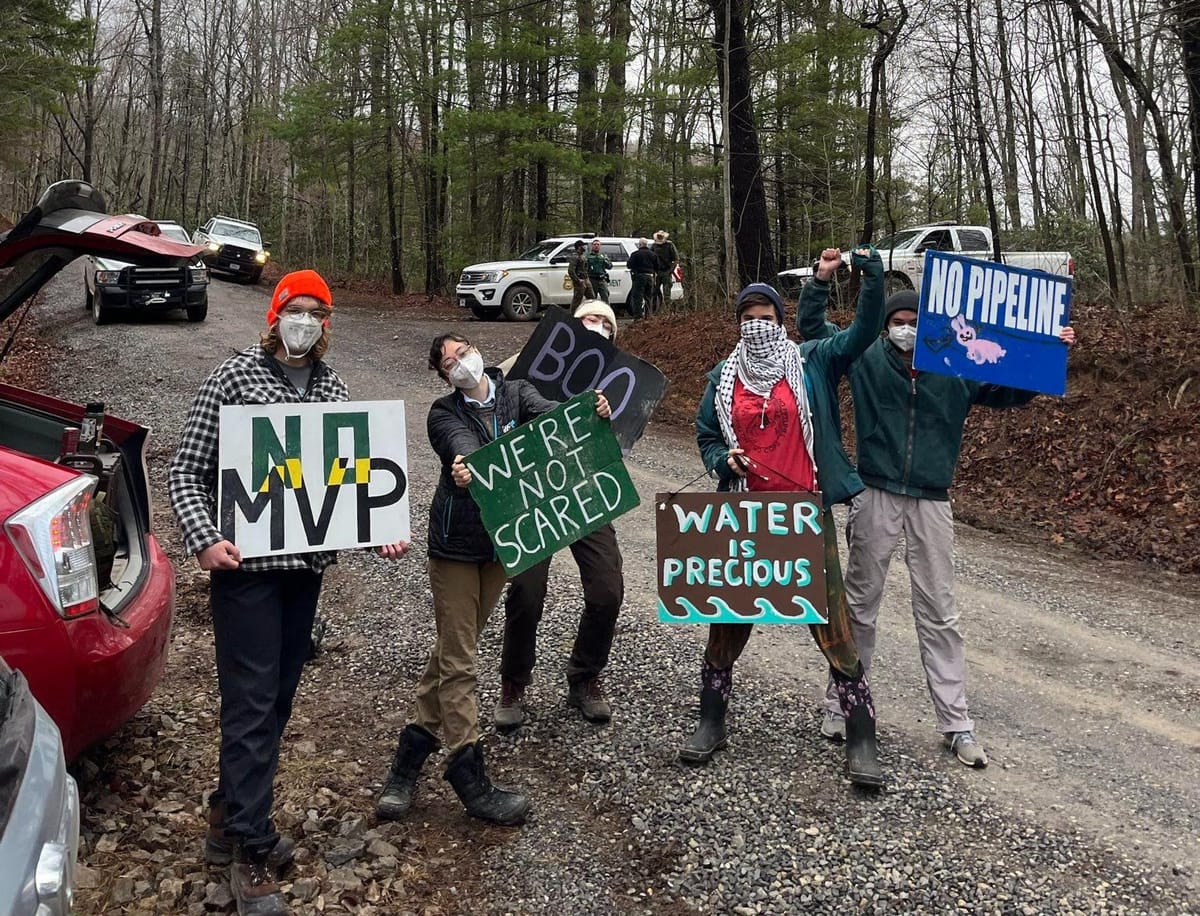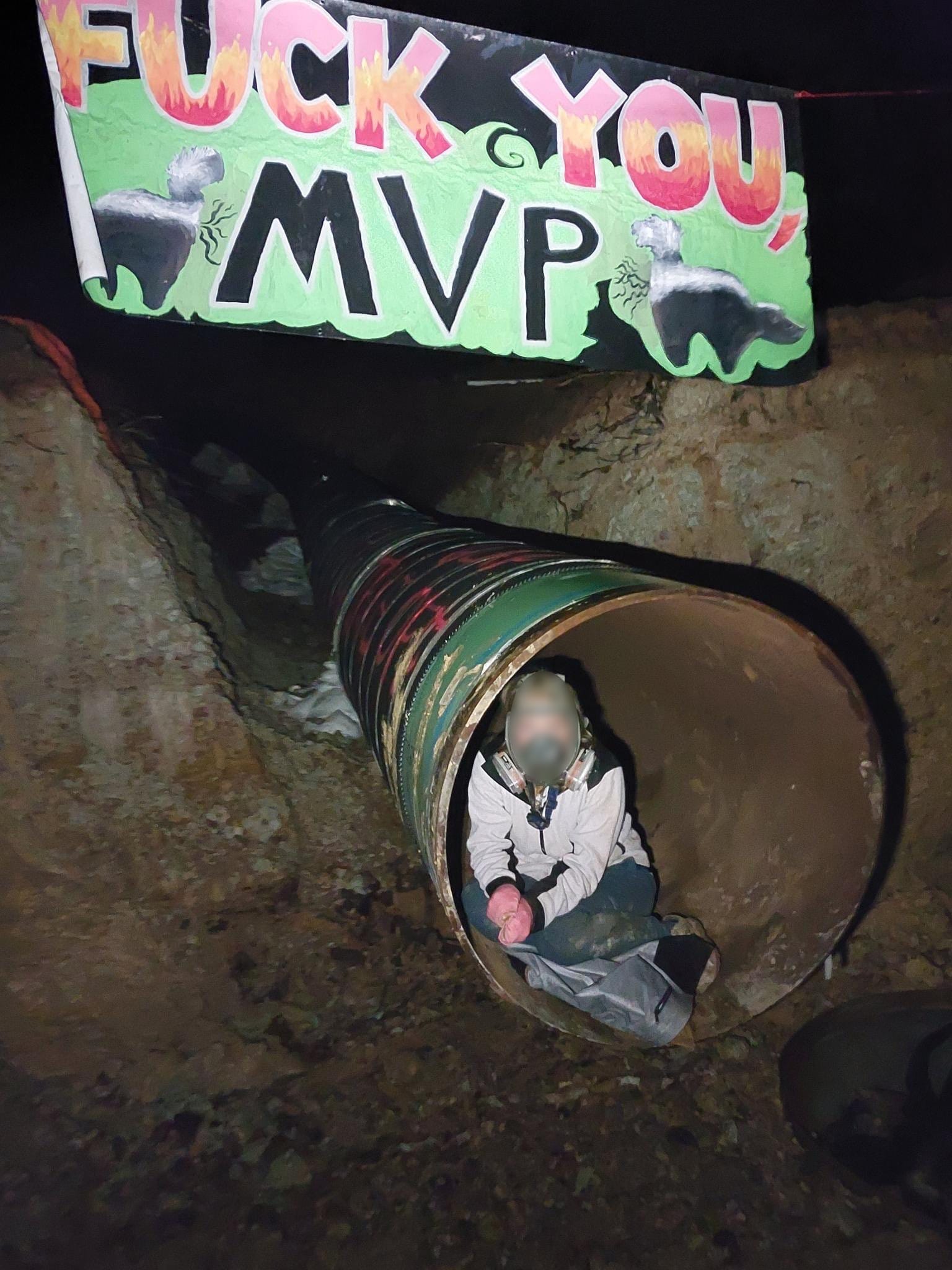"I Hope People Continue to Resist Climate Nightmares"
"The Mountain Valley Pipeline is in service, but that doesn’t mean this campaign is over," says Casey, a pipeline fighter with Appalachians Against Pipelines.

People in the United States hate thinking about climate change. Even people who are well aware that climate chaos is not merely looming but upon us will argue about, binge-watch, or obsess over nearly anything else to avoid the topic. Even as hurricane Beryl, the earliest named storm to ever emerge in the Atlantic, killed 11 people in the Caribbean and seven people in the United States, leaving millions of people without power amid dangerously high temperatures, most people’s attention has been elsewhere. Perhaps people ignore climate change because the problem is simply too large for their wounded psyches to negotiate with. Maybe they ignore it because they feel powerless to do anything about it. I will be the first to admit that when it comes to getting out of this mess (a task that will take several generations, if we are up for the task at all), I do not have all the answers. What I do have is a great deal of admiration for people who refuse to ignore the issue and who wage struggle against the monied forces that would doom most life on earth if they are permitted to do so. One such group is Appalachians Against Pipelines (AAP). In recent years, AAP has waged a relentless campaign of direct actions to stop the Mountain Valley Pipeline – a monstrous 303-mile-long methane gas pipeline that recently became operational. According to some estimates, the annual greenhouse gas emissions the pipeline will support will be the equivalent of 26 to 37 coal-fired power plants.
During its construction, the project faced numerous legal challenges due to hundreds of violations of environmental safety regulations. At one point, the 4th U.S. Circuit Court of Appeals revoked one of the project’s key permits after determining that environmental groups were likely to prevail in a case arguing that regulators wrongly approved the project through a streamlined review process for which the pipeline was not eligible. West Virginia officials proceeded to rewrite environmental regulations in order to allow construction to continue. Activists, however, were not dissuaded by rigged regulatory debates or the machinations of politicians. They continued to stage blockades, including tree-sits, and to organize protests in spite of lawsuits, criminal penalties and smoke inhalation. Through ongoing legal maneuvers and persistent direct action, resistors delayed construction of the pipeline for six years until Biden dealt the resistance effort a decisive blow by striking a deal with Joe Manchin to pass a debt ceiling bill.
In March, as construction of the pipeline neared completion, blockader Ricky Bobby suspended themself inside the Mountain Valley Pipeline on Peters Mountain in Giles County, Virginia. “This project is worth fighting until the end," Bobby stated. During the action, a banner hung outside the pipe read, “FUCK YOU MVP.” Bobby went on to state that "winning looks so much bigger than just stopping this pipeline,” arguing that the community had won important victories through struggle. Bobby cited the relationships pipeline fighters had built and the many skills they had learned and shared as important wins. They also said, “It’s a win because, whether or not this pipeline ever has gas running through it, the legacy of resistance in Appalachia still lives. Extractive industry knows that they can’t fuck with the communities here without going through hell – and we better not let them forget that." Supporters rallied nearby during the disruption, which lasted for more than 12 hours.

While the Mountain Valley Pipeline is now operational, the efforts of groups like AAP should not be forgotten amid the discourse of an election year. We cannot allow struggles to defend life and land to fade into the background as climate disasters worsen. If we are going to save ourselves and the earth itself, we are going to need a growing movement of people who are willing to take direct action in the bold and principled manner that AAP and their allies have throughout this campaign. Their work is part of a much larger legacy of essential struggle, and the people, communities, land, and water they have defended are still in need of advocacy and support.
I was recently able to talk with Casey, an activist with AAP, about the struggle to stop the Mountain Valley pipeline and what we can all learn from it.
Kelly Hayes: What has the movement to stop the Mountain Valley Pipeline looked like? How has this struggle evolved over time?
Casey: The movement against the MVP started when the project was first proposed in 2014. Back in those days, it looked like a lot of community meetings, public comments, and regulatory resistance. Construction started in 2018, and so did the direct action campaign. In late February 2018, two tree sits were erected in the Jefferson National Forest (JNF) near the site where MVP would eventually bore through the mountain under the Appalachian Trail. Those tree sits and later a monopod blockade also in the JNF and later the Yellow Finch tree sits in Elliston, Virginia were really incredible sites of resistance. They were a space for community members to come together and get to know one another and support this movement together.
Since 2018, there have been many dozens of direct actions against the MVP. It’s been really inspiring to see — local folks, folks from afar, young folks, and old folks all coming together to resist this fossil fuel infrastructure. It’s always been a priority to Appalachians Against Pipelines to draw connections and show solidarity with other struggles, both against fossil fuel infrastructure as well as colonialism, racism, militarism, and all other forms of oppression. All of these struggles are interconnected, and it has been so important to us to use our platform to make those connections.
In recent years, the legal repression has really ramped up, but folks have largely been undeterred. MVP started suing people in civil court for taking action against the pipeline. The pipeline company and the cops really tried their hardest to make folks shut up and go away.
It's also worth noting that the movement to stop the MVP is made up of so much more than Appalachians Against Pipelines. There are so many community groups, individuals, and legal groups resisting this pipeline and fighting to protect Appalachia and beyond.
What is the current state of the Mountain Valley Pipeline?
The MVP is in service as of mid-June 2024. The project is $4 billion over budget and six years behind schedule.
What role has President Biden played in undermining this movement?
Ah yes, fuck Biden. Around 2021/2022, MVP had lost many of its permits and the legal challenges were pretty successful at delaying construction. Construction in 2022 was slow or nonexistent in most places. Construction in the first half of 2023 was the same. And then Biden and Manchin made their deal to fast-track the MVP, and boom, construction was moving ahead full speed.
The deal was specifically that all of the pipeline’s permits would be granted within a few days and couldn’t be challenged in court. It was, and is, so absurd. Fuck the U.S. Government and fuck the courts, but … isn’t that deal against the concept of checks and balances that we all learned about in middle school?
What lessons should the broader climate justice movement take away from this ongoing struggle?
The Mountain Valley Pipeline is in service, but that doesn’t mean this campaign is over, and it doesn’t mean we lost. First of all, no campaign is over until everyone’s court cases are fully resolved, so that will be a while.
Folks will always vary in their opinions of what it looks like to win. I think we’re succeeding in changing the narrative, and we’re succeeding in changing the calculation of profitability for all future pipeline projects. If the only language these goons speak is capitalism, then we’ve done our best to beat them at their own game — $4 billion over budget, with an initial budget of $3.5 billion, a final budget of $7.85 billion, is a very big deal. Six years behind schedule is also a very big deal.
I hope that other climate activists are inspired by this campaign. I hope folks in the climate movement prioritize intersectionality and solidarity, and I hope all NIMBY narratives get fucked. I hope people continue to resist climate nightmares and all forms of oppression in the face of legal repression – especially those folks who have the privilege and resources to do so.




